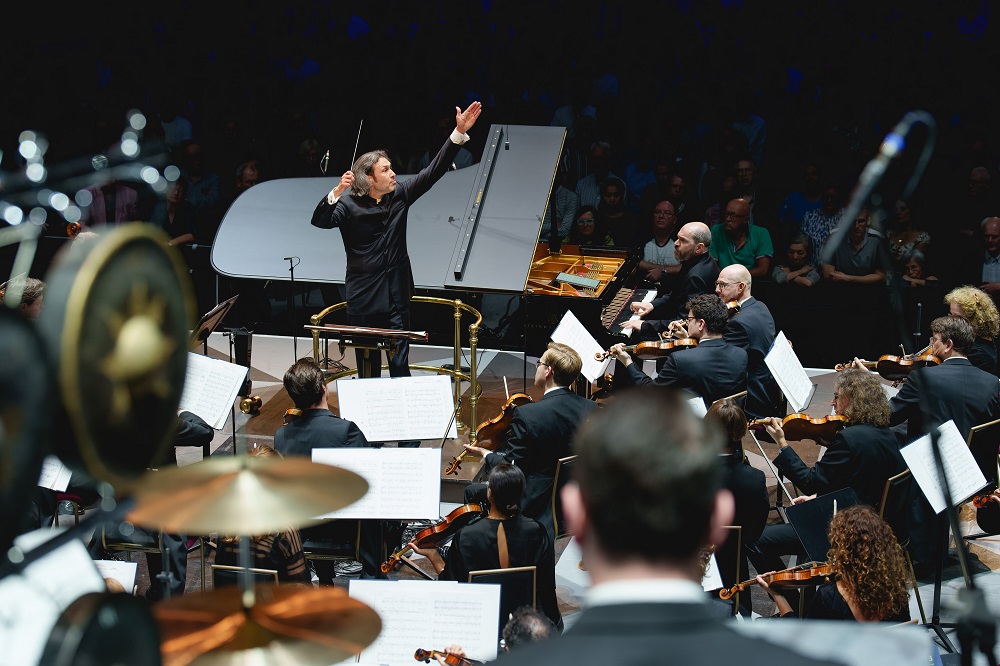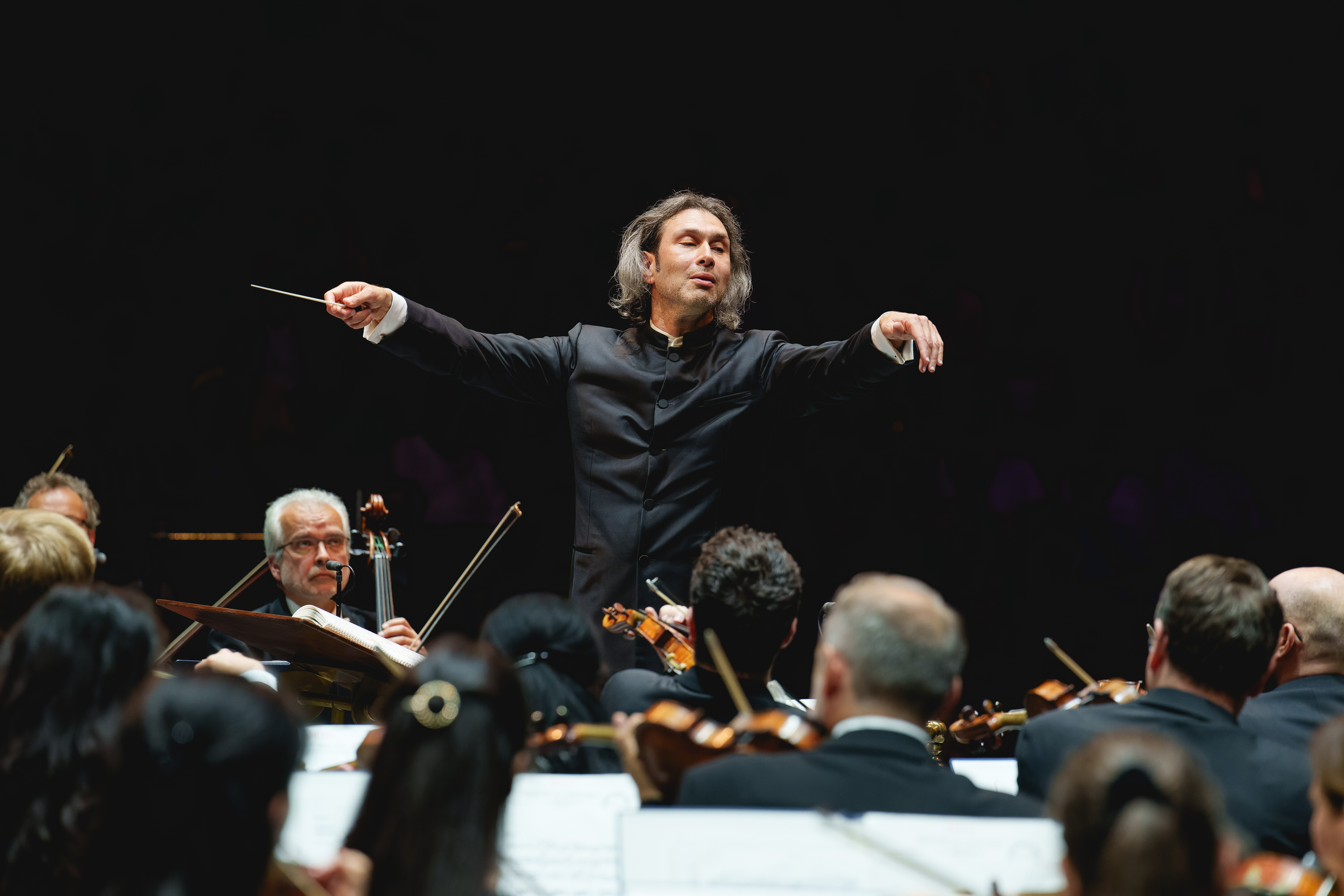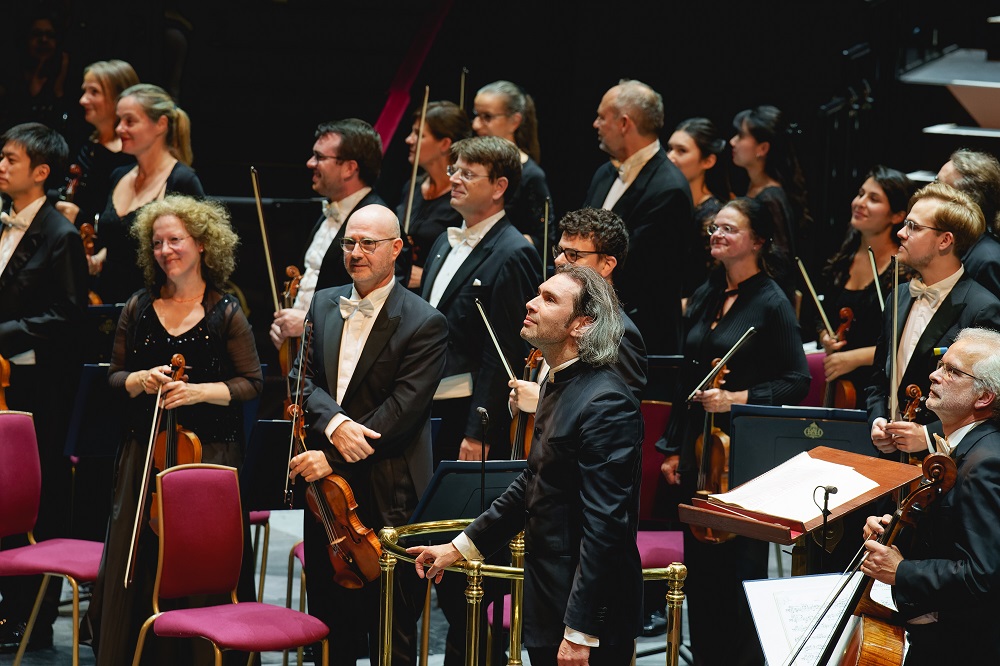During his transformational time at the helm of the London Philharmonic Orchestra, Vladimir Jurowski conducted the complete Threepenny Opera in concert and two performances of Rachmaninov’s Third Symphony which changed my mind about its being good only in parts. Last night’s interpretation made his fellow Russian’s late fantasy billow and soar, while Weill’s Little Threepenny Music opened with sheer stylish delight in the song/dance numbers framed by incisive austerity.
That supposedly orchestral pianist so responsive to a genial Jurowski and the wind players of the Berlin Radio Symphony Orchestra the conductor has taken to such heights as Artistic Director since 2017 looked remarkably like the soloist to come in Thomas Adès' Piano Concerto, Kirill Gerstein. It was, and how he twinkled in descants, filigrees and natty little rejoinders to "the moon over Soho" in the "Instead of That" Song, watching his genial conductor and fellow players like a hawk. If the performance of Stravinsky's Petrushka this season had come from this team, rather than the Boston Symphony Orchestra and Andris Nelsons with Jean-Yves Thibaudet as the concerto soloist last Saturday, I'd bet that Gerstein would take on the crucial piano role in it: next season, perhaps? Gerstein, like Jurowski, is a master of finesse, and especially here of spellbinding conclusions, which made the audience laugh at the end of Adès's first movement, and duly roar after the racy conclusion, a Rachmaninov coda gone wonky. It's good to welcome a sparky newish (2018) work which engages with the standard form so beguilingly (and concisely – it's only 22 minutes long), and the piano writing is as virtuosic as you would expect from Adès's credentials as performer; no wonder Gerstein, who has played it 51 times so far including the premiere with the composer conducting, loves to feature it in concerts. Memorable in its material? Deep? Not really, though the Andante gravamente startst by promising Tippett in spare transcendental mode, doodling away quite differently, and the piano's commending lead in descending to the depths at the end was duly mesmerising. Never mind; nothing outstays its welcome, and the gift simply to entertain, with accomplished handling of a large orchestra as well as a distinctive piano part, is rare in contemporary music.
Gerstein, like Jurowski, is a master of finesse, and especially here of spellbinding conclusions, which made the audience laugh at the end of Adès's first movement, and duly roar after the racy conclusion, a Rachmaninov coda gone wonky. It's good to welcome a sparky newish (2018) work which engages with the standard form so beguilingly (and concisely – it's only 22 minutes long), and the piano writing is as virtuosic as you would expect from Adès's credentials as performer; no wonder Gerstein, who has played it 51 times so far including the premiere with the composer conducting, loves to feature it in concerts. Memorable in its material? Deep? Not really, though the Andante gravamente startst by promising Tippett in spare transcendental mode, doodling away quite differently, and the piano's commending lead in descending to the depths at the end was duly mesmerising. Never mind; nothing outstays its welcome, and the gift simply to entertain, with accomplished handling of a large orchestra as well as a distinctive piano part, is rare in contemporary music.
To, as he put it, get everyone "in the mood" for the Rachmaninov Third in the second half of the concert, Gerstein offered as encore his own transcription of the song "In the silence of the secret night": wrapped just as the composer himself would have done it – and did, with several others songs – and with another ineffable coda, this time dematerialising into the Albert Hall vasts at the end; Rachmaninov would have loved it.  As he surely would Jurowski's perfectly paced interpretation of the Third Symphony, inspired by the composer's own recording as a conductor (though absolutely not a carbon copy). As in his LPO performances and recording, Jurowski eschews the first movement's exposition repeat – it really isn't necessary if the emotional undertow of the hearteasing second subject is emphasised with this sort of elasticity, moving to tears – and puts all the racy tension into the disturbed development, well shaped to a shattering climax with the chant motto of the symphony declaring its sternest hand. The strings of Berlin Radio Symphony need fear no comparisons with their better-known counterparts in the Philharmonic; here they applied all the love and lushness Rachmaninov catered for in the Philadelphia Orchestra (stunningly guided by another of our greatest conductors, Yannick Nézet-Séguin, in a Rachmaninov orchestral works series on CD which made me fall in love with them all again).
As he surely would Jurowski's perfectly paced interpretation of the Third Symphony, inspired by the composer's own recording as a conductor (though absolutely not a carbon copy). As in his LPO performances and recording, Jurowski eschews the first movement's exposition repeat – it really isn't necessary if the emotional undertow of the hearteasing second subject is emphasised with this sort of elasticity, moving to tears – and puts all the racy tension into the disturbed development, well shaped to a shattering climax with the chant motto of the symphony declaring its sternest hand. The strings of Berlin Radio Symphony need fear no comparisons with their better-known counterparts in the Philharmonic; here they applied all the love and lushness Rachmaninov catered for in the Philadelphia Orchestra (stunningly guided by another of our greatest conductors, Yannick Nézet-Séguin, in a Rachmaninov orchestral works series on CD which made me fall in love with them all again).
We saw the necessary mobility in the Berlin RSO strings' free movement, engagingly led by concertmaster Erez Ofer, and the woodwind, exquisitely so in the lovely solos Rachmaninov gives to first flute (Silke Uhlig), oboe (Mariano Esteban Barco) and bassoon (Sung Kwon You), very much carrying on the delights we'd heard so well projected in the Weill by saxophonists Karola Elßner and Christoph Enzel. Jurowski's biggest triumph in this American-era work has always been to stress the continuity of the finale – dance celebrations clouded, as so often in this composer, by the threat of the Dies Irae or Latin "Day of Wrath" chant, but sometimes seeming to grind too often to a halt. Not here: the fantasy and mystery kept us on tenterhooks to the glittering final victory. Jurowski's stick technique is always a joy to watch, and joy, too, now seems the visible keynote of everything he does. Thoughtful as ever, Jurowski gave us an encore which connected to the spirit of the place. Henry Wood had conducted the UK premiere of the Third Symphony at the Proms in 1938 – Rachmaninov quipped that he and violinist Adolf Busch were the only two people who liked the work apart from himself (how times have changed) – so the present conductor threw taste to the winds and encouraged his Berlin orchestra to go for the Gothic jugular in Wood's arrangement of the C sharp minor Prelude, out Stokowski-ing Stokowski as transcriber. We laughed, but with pleasure: such a neat counterbalance to the wit in the Weill at the start of this vintage Prom.
Thoughtful as ever, Jurowski gave us an encore which connected to the spirit of the place. Henry Wood had conducted the UK premiere of the Third Symphony at the Proms in 1938 – Rachmaninov quipped that he and violinist Adolf Busch were the only two people who liked the work apart from himself (how times have changed) – so the present conductor threw taste to the winds and encouraged his Berlin orchestra to go for the Gothic jugular in Wood's arrangement of the C sharp minor Prelude, out Stokowski-ing Stokowski as transcriber. We laughed, but with pleasure: such a neat counterbalance to the wit in the Weill at the start of this vintage Prom.














Add comment